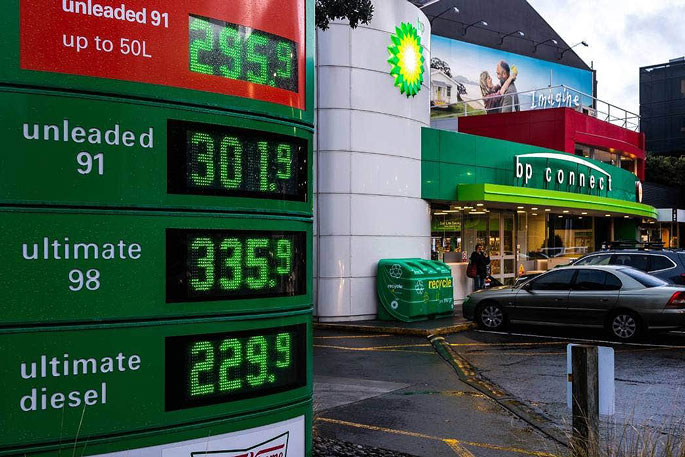Prices at the petrol pump have now risen past $3 in some regions – but the Government says it would be “unsustainable” to subsidise it again.
On Wednesday morning prices for 91 were above $3 a litre at most stations in Auckland and Wellington.
In the North Island, a central Hamilton Z had the highest price in the town at $2.88, in Whangārei it was $3.02, in Napier it was $2.91, in Rotorua it was $2.95 but in Taupō it was $3.05. In Masterton it was $2.96 and in Levin it was $2.85.
In central Christchurch, prices were reaching $2.89 a litre, in Nelson it was $2.98, in Dunedin it was $2.86, in Timaru it was $2.77, in Queenstown it was $3.06 and in Invercargill it was $2.83.
These prices were last seen before the fuel excise duty tax cut was introduced in March last year, which meant 25 cents was taken off the price per litre of petrol. Road user charges were also cut.
The cost at the pump is made up by a number of factors including taxes, global and local market prices and the cost of getting fuel to petrol stations.
Diesel prices are also rising throughout the country. In Auckland central, it was up to $2.35 a litre, in Wellington it was $2.29 and in Christchurch it was $2.15.
The price increase is not unexpected because the fuel excise duty tax cut ended on June 30, which instantly added up to 29 cents on petrol. The price of crude oil is now sitting at US$86 at barrel.
AA principal adviser Terry Collins says, as a generalisation, “we should expect to see prices go up and over the next few years it will be less about international price of oil and more about internal drive”.
That included what the country was doing to meet its climate change obligations.
The continued announcements of new roading projects and the ongoing cost of maintaining the roads would also have an impact on prices.
“That has to be paid for, so it’s either more fuel excise duty (FED) or more road user charges (RUC). ACC costs will climb as like most investment funds the past year they didn’t get the returns they expected, and we will add GST to the lot.
“It will be a bit of a roller coaster, but all indications are that it will be an upward climb.”
Finance Minister Grant Robertson says there's no intention to reduce fuel taxes again and it was “always a temporary measure”.
”Oil prices are determined internationally and it is not sustainable to continue subsiding it in the long term given other demands on government spending in a deteriorating global environment.
“We need to strike a balance as the revenue from fuel taxes does go directly towards the funding of new roads, improvements and maintenance, public transport, road safety, walking and cycling.”



0 comments
Leave a Comment
You must be logged in to make a comment.